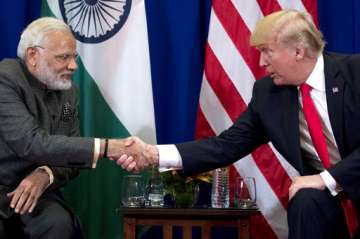Reacting cautiously to President Donald Trump changing his focus from “Asia-Pacific” to “Indo-Pacific”, the state-run Chinese media has said that the new alliance of India, US, Australia and Japan may end prematurely.
An article in “Global Times” pointed out that the Trump administration has proposed a new South Asia policy which aims to strengthen relations with India in order to increase US influence in South Asia and the Indian Ocean region.
“From the Asia-Pacific to the Indo-Pacific, indicates an extension of the US' Asian policy direction. In August, the Trump administration proposed a new South Asian policy in an effort to enhance relations with India so it can increase its influence in South Asia and the Indian Ocean region,” the article said.
“The rapid rise of India's economy and regional influence are important reasons why the US intends to rope in India. The important geopolitical and economic status of India and the Indian Ocean can't be overlooked,” it added.
The article accused Trump of abandoning Barack Obama’s "rebalance to Asia" strategy by trying to balance China indirectly by finding a new focus and safeguarding the international system led by the US.
The article further said that the introduction of the Indo-Pacific concept is a reaction on part of these countries to China’s growing international influence as a result of its Belt and Road (B&R) initiative.
It also added that after China’s B&R initiative, Japan has been actively competing with China for infrastructure projects in Southeast Asia and it jointly launched the Asia Africa Growth Corridor program with India covering the Asia-Pacific and African regions.
The article went on to say that the enthusiastic response to China’s B&R initiative forced US to rapidly bring India, Japan and Australia to its side with an objective of indirectly hedging China's growing influence.
However, the article predicted that this rushed connection could end prematurely ”given the haste in which it was conceived.”
Terming Donald Trump a “commercially minded” president, the article said that he is likely unwilling to assume more responsibility for the economy and security of its allies.
Explaining its rationale, the article pointed out that though Australia always held an ambiguous attitude toward China and the US, it hopes to expand its influence in the Indo-Pacific region by utilizing the protection of the US but is also reluctant to give up the enormous economic interests of trading with China.
Commenting on the role of India, the article said that the country’s non-aligned tradition and longstanding strategic autonomy make it hard for New Delhi to participate deeply in the team.
As for Japan, the article pointed out that the most passionate participant of the union, will ultimately fail to accomplish anything if it lacks strong support from the other three nations.
Latest World News
